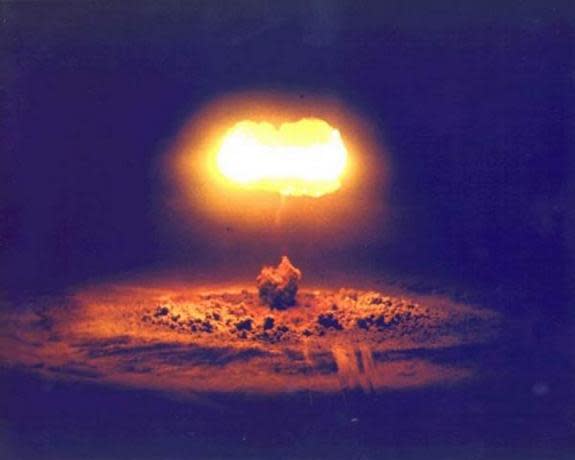'Small' Nuclear War Could Trigger Catastrophic CoolingLiveScience.com
By Charles Q. Choi, LiveScience Contributor March 29, 2014 2:10 PM

Even a relatively small regional nuclear war could trigger global cooling, damage the ozone layer and cause droughts for more than a decade, researchers say.
These findings should further spur the elimination of the more than 17,000 nuclear weapons that exist today, scientists added.
During the Cold War, a nuclear exchange between superpowers was feared for years. One potential consequence of such a global nuclear war was "nuclear winter," wherein nuclear explosions sparked huge fires whose smoke, dust and ash blotted out the sun, resulting in a "twilight at noon" for weeks. Much of humanity might eventually die from the resulting crop failures and starvation.
Today, with the United States the only standing superpower, nuclear winter might seem a distant threat. Still, nuclear war remains a very real threat; for instance, between developing-world nuclear powers such as India and Pakistan.
To see what effects such a regional nuclear conflict might have on climate, scientists modeled a war between India and Pakistan involving 100 Hiroshima-level bombs, each packing the equivalent of 15,000 tons of TNT — just a small fraction of the world's current nuclear arsenal. They simulated interactions within and between the atmosphere, ocean, land and sea ice components of the Earth's climate system.
Scientists found the effects of such a war could be catastrophic.
"Most people would be surprised to know that even a very small regional nuclear war on the other side of the planet could disrupt global climate for at least a decade and wipe out the ozone layer for a decade," study lead author Michael Mills, an atmospheric scientist at the National Center for Atmospheric Research in Colorado, told Live Science.
The researchers predicted the resulting firestorms would kick up about 5.5 million tons (5 million metric tons) of black carbon high into the atmosphere. This ash would absorb incoming solar heat, cooling the surface below.
The simulations hint that after such a war, global average surface temperatures would drop suddenly by about 2.7 degrees Fahrenheit (1.5 degrees Celsius), their lowest levels in more than 1,000 years. In some places, temperatures would get significantly colder — most of North America, Asia, Europe and the Middle East would experience winters that are 4.5 to 10.8 degrees F (2.5 to 6 degrees C) colder, and summers 1.8 to 7.2 degrees F (1 to 4 degrees C) cooler. The colder temperatures would lead to lethal frosts worldwide that would reduce growing seasons by 10 to 40 days annually for several years.
The ash that absorbed heat up in the atmosphere would also intensely heat the stratosphere, accelerating chemical reactions that destroy ozone. This would allow much greater amounts of ultraviolet radiation to reach Earth's surface, with a summertime ultraviolet increase of 30 to 80 percent in the mid-latitudes, posing a threat to human health, agriculture and ecosystems on both land and sea.
The models also suggest colder temperatures would reduce global rainfall and other forms of precipitation by up to about 10 percent. This would likely trigger widespread fires in regions such as the Amazon, and it would pump even more smoke into the atmosphere.
"All in all, these effects would be very detrimental to food production and to ecosystems," Mills said.
Previous studies had estimated that global temperatures would recover after about a decade. However, this latest work projected that cooling would persist for more than 25 years, which is about as far into the future as the simulations went. Two major factors caused this prolonged cooling — an expansion of sea ice that reflected more solar heat into space, and a significant cooling in the upper 330 feet (100 meters) of the oceans, which would warm back up only gradually.
"This is the third independent model examining the effects a regional nuclear conflict on the atmosphere and the ocean and the land, and their conclusions all support each other," Mills said. "It's interesting that every time we've approached this same question with more sophisticated models, the effects seem to be more pronounced."
These findings "show that one could produce a global nuclear famine using just 100 of the smallest nuclear weapons," Mills said. "There are about 17,000 nuclear weapons on the planet right now, most of which are much more powerful than the 100 we looked at in this study. This raises the questions of why so many of these weapons still exist, and whether they serve any purpose."
The scientists detailed their findings in the March issue of the journal Earth's Future.
http://news.yahoo.com/small-nuclear-war-could-trigger-catastrophic-cooling-181056235.html...
In other science news, a 'small' nuclear war could trigger catastrophic
dying...
![]() 6 new categories and 72 new items added to the shop!
6 new categories and 72 new items added to the shop!![]() 6 new categories and 72 new items added to the shop!
6 new categories and 72 new items added to the shop!